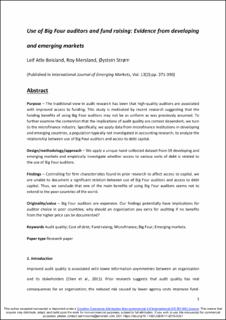Use of Big Four auditors and fund raising: evidence from developing and emerging markets
Peer reviewed, Journal article
Accepted version
Permanent lenke
https://hdl.handle.net/11250/2772061Utgivelsesdato
2018-04-16Metadata
Vis full innførselSamlinger
- Publikasjoner fra Cristin [3269]
- SAM - Handelshøyskolen [392]
Originalversjon
International Journal of Emerging Markets. 2018, 13 (2), 371-390. https://doi.org/10.1108/IJoEM-11-2016-0321Sammendrag
Purpose: The traditional view in audit research has been that high-quality auditors are associated with improved access to funding. This study is motivated by recent research suggesting that the funding benefits of using Big Four auditors may not be as uniform as was previously assumed. To further examine the contention that the implications of audit quality are context dependent, we turn to the microfinance industry. Specifically, we apply data from microfinance institutions in developing and emerging countries, a population typically not investigated in accounting research, to analyze the relationship between use of Big Four auditors and access to debt capital. Design/methodology/approach: We apply a unique hand-collected dataset from 59 developing and emerging markets and empirically investigate whether access to various sorts of debt is related to the use of Big Four auditors. Findings: Controlling for firm characteristics found in prior research to affect access to capital, we are unable to document a significant relation between use of Big Four auditors and access to debt capital. Thus, we conclude that one of the main benefits of using Big Four auditors seems not to extend to the poor countries of the world. Originality/value: Big Four auditors are expensive. Our findings potentially have implications for auditor choice in poor countries; why should an organization pay extra for auditing if no benefits from the higher price can be documented?

